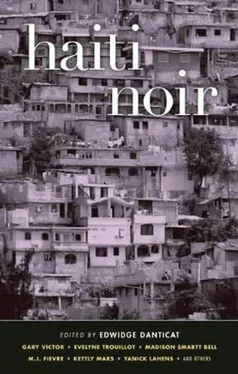“I don’t think a girl should be allowed to go to nightclubs until she’s eighteen,” he says.
I nod my head up and down, like a bobble doll, pretending to be interested.
Papa looks at me. “You don’t like me much, do you?”
I raise my shoulders in annoyance. “Don’t be ridiculous.”
He takes a deep breath. “What if I let you go out with your friends tonight?”
Just like that. My life in Kenscoff becomes a dazzling succession of house parties, balls, gaieties, not only night after night, but also sometimes an afternoon gathering at one house followed by an evening party somewhere else. I dance, sing, and drink toasts with cheap beers. I wear trendy wide-leg jeans, white denims, belly shirts of neon colors, dresses with abstract, multicolored designs. At seventeen, I feel like I’m running my own show. I understand what it means to live at the rainbow’s end and have its colors shimmer about me.
Tonight, Lakoup Nightclub is crowded, noisy, and literally vibrating with the beat of music blasting through large speakers. The air itself is alive with energy, the crowd abuzz with anticipation. I walk into the music, into the shadows, and the hot, sticky night presses against my skin until perspiration beads my upper lip. People line up three deep at the bar, in the rez-de-chaussée of the old gingerbread house. The bartender is chatting with a woman. “What is so dreadful about your hair that someone would call it dreadlocks?” she asks.
I don’t know the number of gourdes required for a Coca-Cola or a Prestige beer. I let the sexy bartender get me a cocktail “on the house.” I explore the dark, empty rooms upstairs. I walk out on the balcony, the den of iniquity, where a couple is smoking something with a peculiar smell. The girl laughs and reaches up. She slips her hand under the boy’s blue shirt, up near the collar. Her hand is moving, rubbing the boy’s neck. They’re in search of privacy, but I just stand there. Then the couple leaves and I’m alone, under the stars, sipping my cocktail, watching people dancing downstairs, in the yard.
From the balcony, I can see the band in the backyard. Lead singer Michel Martelly’s voice is strong and unlabored even when reaching for notes in the upper registers. I love the grainy vocal quality that lends the band a tortured but familiar sound, as if one were remembering a bad day. Martelly keeps listeners hanging on every phrase, awaiting the next pause or streak or curve.
“Hello,” a voice says behind me.
There’s something boyish about the man standing there- the dimples and the apple cheeks. His hair is wild and shaggy, as if the wind has been playing with it. He’s probably in his late twenties, handsome, with broad shoulders and a narrow waist.
“Do you want to dance?” he asks.
He says his name is Ben and he is a lanky mulatto. As he moves me around in a circle, Michel Martelly sings, “Yon samdi swa nan lakou Lakoup, desten fè de moun kontre.” On a Saturday night, at Lakoup Nightclub, their destinies intertwined. The singer laughs and adds to the lyrics, “But he was a mad, mad man.” Ben’s hands leave damp spots on my back. He smells of oiled wood, and during the next dance he pulls back to look at me and says that I’m pretty. He gets me another drink.
Then we are lounging in the parking lot, his back against his beat-up Volkswagen, blowing smoke rings to the sky, watching them rise and disappear slowly. He calls me a wild grimèl. We can still hear the crunching guitar and the keyboard. They come together to create a sometimes sultry, sometimes dreamy, and sometimes raucous feel. I want to listen to Michel Martelly forever. His voice is both loud and strong and soft and vulnerable. His solos are the sound of supreme confidence: not aggressive or necessarily flashy, but casually assuring that every impulse will pay off.
“I’d like to see you again,” Ben says with a grin that crinkles the laugh lines around his eyes and deepens the grooves that bracket his mouth.
We meet again at another party in Pétionville, in a two-story brick house with an iron balcony. Ben’s eyes are chocolatebrown; his smile, easy and warm, makes me feel like the only person he’s ever truly smiled at.
While we’re dancing by the pool, a young man accidentally bumps into Ben.
“Watch it, fucker,” Ben says with a flash of recognition in his eyes.
“What did you call me?” the other man asks.
I give a horrible squeal, like a kitten under a rocking chair, when the stranger pushes both Ben and me into the pool. I don’t even have time to take a breath before I find myself underwater. Wild fear grabs the edges of my mind. Panic pounds loudly in my temples and twines my heart. I kick and squirm, fighting to get back to the surface. My lungs are screaming for air. I am choking. I am drowning. I gulp big mouthfuls of water; I can feel it going up to my nose and down into my lungs.
With one hand, Ben helps me out of the water. In the other hand, he’s holding a gun.
He fires toward the sky. Gunshots pop like firecrackers. The air is electric-people run around in circles and scream, boys hold their girlfriends’ hands. Leaving Ben behind, I plow through the madness to the side of the bar. I drop to the floor, crouching beneath the porch railing. There are too many people to see what’s happening; I am caught in a spiral of chaos and movement, charging, rushing, spinning, trampling. Just a sea of people and crashing movement. There is more running, sauve qui peut, and dizziness. I press my hands against my temples as two more gunshots shatter the air.
The other guy is gone. Ben calms down. He finds me in the crowd and asks me if I’m okay. There’s a dangerous flicker in his eyes.
I don’t go out that much anymore because Ben seems to materialize everywhere. Besides, there’s the embargo and the gas prices have skyrocketed, making it impossible to get around town. My father often spends half a day in a line to get his tank filled; no gas container allowed. I can only go to school three times a week. On school days, because of the traffic caused by the long lines, the alarm clock rings at four o’clock in the morning.
“C’est l’heure! C’est l’heure!” my mother chants each morning as she opens the windows for the mountain air to rush in.
We fetch water from a cistern built under the house for our bath and press our clothes with a smoky charcoal iron, whose hollow interior is filled with smoldering coals. High, spoutlike openings allow for the coals to be fanned when swinging the iron back and forth vigorously.
If there’s no electricity, I do my homework by candlelight. After I’ve studied a whole chapter on the French Revolution or read about la Négritude, there’s not much to do and I’m bored out of my mind.
I don’t remember giving him my phone number. But Ben calls.
We talk every night. I sit Indian-style, wringing, twirling the curly phone cord in my left hand, receiver tucked between my ear and left shoulder, until hours later it leaves hickeys on my ear. I tell him about my father. One moment Papa is normal, calm, quiet, in control, reliable; the next he is a wildeyed stranger, screaming so loud my ears sting. His eyebrows join together in a frown line across his forehead. His thin face is stern, lips latched tight, and his black-rimmed glasses magnify his furious eyes.
“If you ever need me to kick his ass,” Ben says, “I’m one phone call away.”
Ben is not that bad, after all. He might be dangerous-but he’s also fun. He doesn’t try to hide his trying to get into my pants. We have phone sex once, or so he thinks. I am only pretending, playing Tetris silently on my Game Boy. Maybe he’s faking it too.
I want to learn how to drive. Ben knows someone who knows someone else who works at the Department of Highway Control. I get my driver's license before I ever sit behind a wheel. I think that once I get the rectangular piece of colorful plastic, it will be easier to convince my parents to send me to driving school. Well, no. Papa says I am too impulsive to drive a car.
Читать дальше












